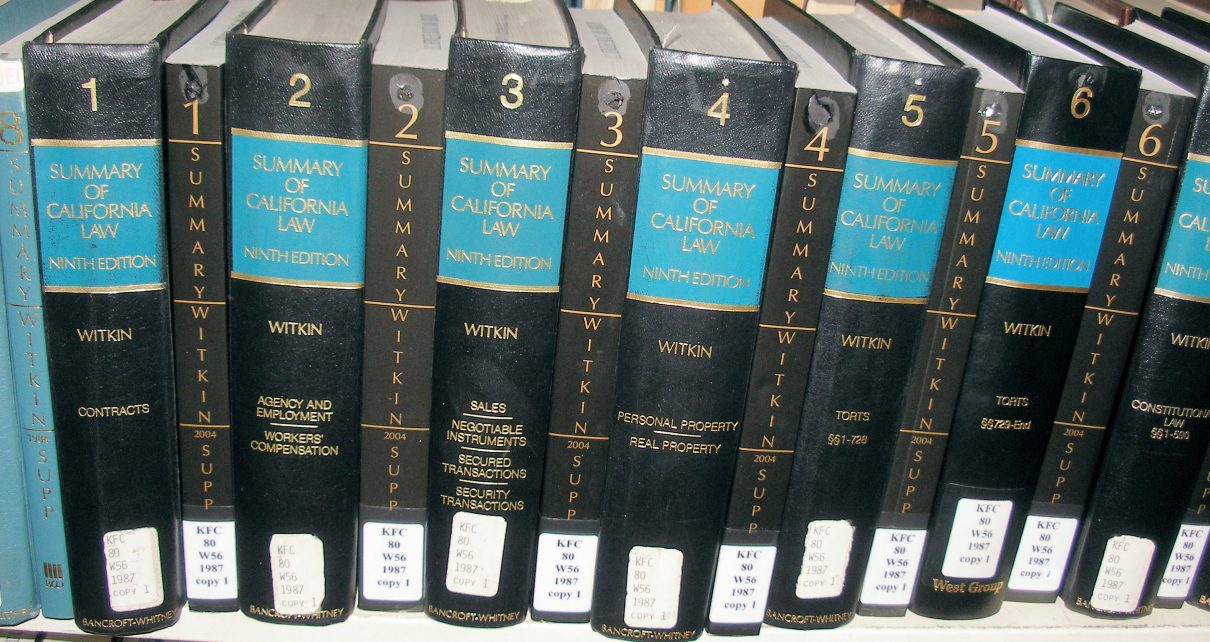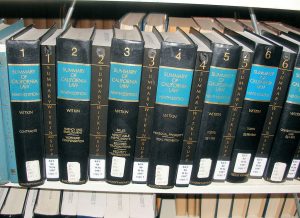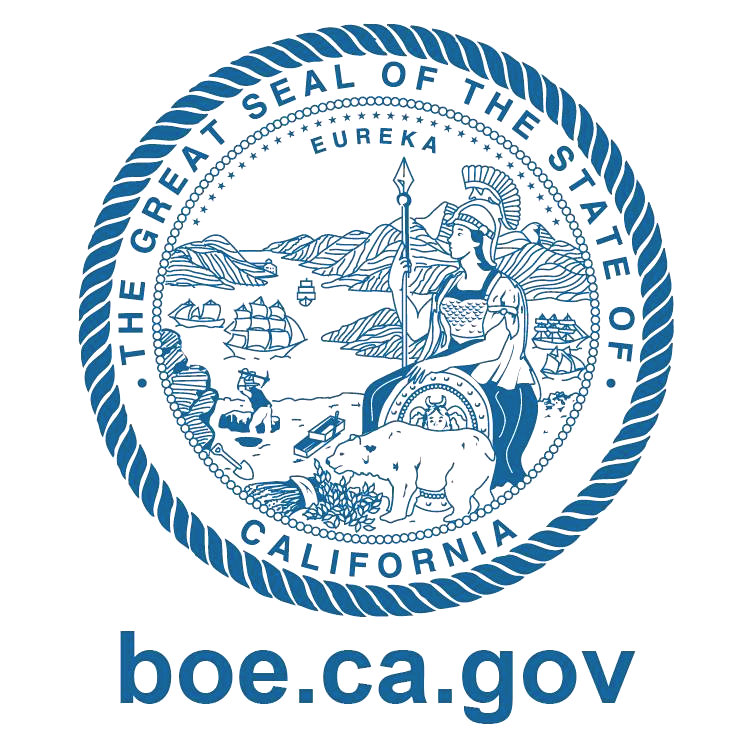
Old law books. (Photo: ebay)
California’s Tax Agencies
The EDD is the largest tax collection agency in the state
By Chris Micheli, August 8, 2020 7:37 am
California’s tax system actually involves four state departments. And, most Californians do not realize that the EDD is the largest tax collection agency in the state. The purpose of this article is to provide a broad overview of the tax agencies in this state.
Franchise Tax Board

Government Code Title 2, Division 3, Part 10 designated the Franchise Tax Board (FTB) in 1953 in Sections 15700 to 15705. Section 15700 establishes the FTB in state government, in the Government Operations Agency, and specifies that the Board consists of the Controller, Director of Finance, and the Chairperson of the State Board of Equalization.
The FTB is successor to all of the duties, powers, purposes, responsibilities, and jurisdiction of the Franchise Tax Commissioner, but the statutes and laws under which that office existed and all laws prescribing the duties, powers, purposes, responsibilities, and jurisdiction of that office. Pursuant to Section 15701, the FTB appoints an executive officer, who must be confirmed by a 2/3 vote of the Senate.
In addition, the Revenue and Taxation Code Division 2, Part 10.2, Chapter 7, Article 1 sets forth the powers and duties of the FTB in Sections 19501 to 19533. The FTB administers the income and franchise taxes for individual and business taxpayers.
According to the FTB, its “mission is to help taxpayers file tax returns timely, accurately, and pay the correct amount to fund services important to Californians.” Their programs include filing, collection, audit, technology, and legal.
Department of Tax and Fee Administration
The California Department of Tax and Fee Administration (CDTFA) was established in 2017 as part of the state budget accord that year. In Revenue and Taxation Code Section 20.5, CDTFA took over most of the duties, powers and responsibilities from the State Board of Equalization. This is specified in Government Code Section 15570.22.
Revenue and Taxation Code Title 2, Division 3, Part 8.7 sets forth the CDTFA in Section 15570 to 15570.100. Part 8.7 was added in 2017 and Chapter 1 concerns Administration. Section 15570 establishes within state government the CDTFA in the Government Operations Agency. The law requires its headquarters to be in Sacramento. The Governor appoints the director, chief deputy director, and chief counsel.
According to CDTFA, its responsibility is to administer the state’s “sales and use, fuel and tobacco taxes, as well as a variety of other taxes and fees that fund specific state programs.” In addition, “The mission of the CDTFA is to make life better for Californians by fairly and efficiently collecting the revenue that supports our essential public services.”
Employment Development Department
California’s Employment Development Department (EDD) is one of the largest state departments with employees at hundreds of service locations throughout the state. For more than 70 years, EDD has connected millions of job seekers and employers in an effort to build the economy of the Golden State.
EDD is found in the Unemployment Insurance Code, Division 1, Part 1, Chapter 2, Article 1, in Sections 301 to 336. Section 301 establishes the EDD within the Labor and Workforce Development Agency. And, the EDD is vested with the duties, purposes, responsibilities, and jurisdiction heretofore exercised by the State Department of Benefit Payments or the California Health and Human Services Agency with respect to job creation activities.
In addition, the EDD is administered by an executive officer known as the Director of Employment Development and is vested with the duties, purposes, responsibilities, and jurisdiction previously exercised by the Director of Benefit Payments. Among the duties of the EDD Director are those functions related to:
(a) Job creation activities.
(b) Making manual computations and making or denying recomputations of the amount and duration of benefits.
(c) Determination of contribution rates and the administration and collection of contributions, penalties and interest, including but not limited to filing and releasing liens.
(d) Establishment, administration, and transfer of reserve accounts.
(e) Making assessments and the administration of credits and refunds.
(f) Approving elections for coverage or for financing unemployment and disability insurance coverage.
In Welfare and Institutions Code Division 9, Part 2, Chapter 2, Article 2, sets forth additional powers of duties in Section 10600 to 10619. Section 10602.4 requires the EDD to investigate, examine, and make reports upon the public officers who are in any way responsible for the administration of public funds used for services which are administered by the EDD.
State Board of Equalization
The State Board of Equalization (SBE) is the only tax agency found in the California Constitution. It is established in Article XIII, dealing with taxation. Section 17 of Article 13 provides for the Board of Equalization and establishes a 5-voting member Board, which are the Controller and four Members elected to 4-year terms at gubernatorial elections.
In addition, Section 15 provides that the State is divided into four SBE districts with the voters of each district electing one member. No member may serve more than 2 terms like other state constitutional officers. There are also provisions in the California Government Code and the Revenue and Taxation Code related to the SBE.
For example, Government Code Title 2, Division 3, Part 9, Sections 15600 to 15653 deals with the State Board of Equalization. Chapter 1 of Part 9 provides general provisions, including Section 15600 which specifies that the SBE is in state government. It also limits the SBE to only having the following duties, powers, and responsibilities:
(1) The review, equalization, or adjustment of a property tax assessment pursuant to Section 11 of Article XIII of the California Constitution, and any duty, power, or responsibility conferred by statute on the board in connection with that review, equalization, or adjustment.
(2) The measurement of county assessment levels and adjustment of secured local assessment rolls pursuant to Section 18 of Article XIII of the California Constitution, and any duty, power, or responsibility conferred by statute on the board in connection with that measurement and adjustment.
(3) The assessment of pipelines, flumes, canals, ditches, and aqueducts lying within two or more counties and property, except franchises, owned or used by regulated railway, telegraph, or telephone companies, car companies operating on railways in the state, and companies transmitting or selling gas or electricity pursuant to Section 19 of Article XIII of the California Constitution, as well as the equalization of that assessment, and any duty, power, or responsibility conferred by statute on the board in connection with that assessment.
(4) The assessment of taxes on insurers pursuant to Section 28 of Article XIII of the California Constitution and any duty, power, or responsibility conferred by statute on the board in connection with that assessment and equalization.
(5) The assessment and collection of excise taxes on the manufacture, importation, and sale of alcoholic beverages in this state pursuant to Section 22 of Article XX of the California Constitution, and any duty, power, or responsibility conferred by statute on the board in connection with that assessment and collection.
(6) The administration of the welfare exemption provided by Section 214 of the Revenue and Taxation Code and the veterans’ organization exemption provided by Section 215.1 of the Revenue and Taxation Code, including issuing an organizational clearance certificate and reviewing assessors’ administration of those exemptions as required pursuant to Sections 254.5 and 254.6 of the Revenue and Taxation Code.
(7) The responsibility for receiving a change in ownership statement required to be filed due to a change in control or a change in ownership of a corporation, partnership, limited liability company, or other legal entity pursuant to Sections 480.1 and 480.2, respectively, of the Revenue and Taxation Code.
(8) The administration of Chapter 8 (commencing with Section 54900) of Part 1 of Division 2 of Title 5 of the Government Code, commonly known as the Tax-Rate Area System.
Office of Tax Appeals
The Office of Tax Appeals (OTA) is an independent entity created by the Taxpayer Transparency and Fairness Act of 2017. Its mission is to “provide a fair, objective and timely process for appeals from California taxpayers.” In Government Code Title 2, Division 3, Part 9.5, Section 15670, there is established the Office of Tax Appeals in state government. Part 9.5 was added in 2017.
Pursuant to Section 15670, OTA is under the control of a director who is appointed by the Governor, along with a chief deputy director, and chief counsel. The director is subject to confirmation by the State Senate. The direct is required to administer and direct the day-to-day operations of OTA, including staffing for hearing offices and appeals hearings so that they are heard and resolved in a timely and efficient manner.
In each OTA office, there are tax appeals panels, with each panel consisting of three administrative law judges (ALJ) who are designated by the OTA director. The ALJs must be active members of the State Bar of California for the prior five years and must have knowledge and experience with regarding to the administration and operation of federal and state tax and fee laws. The ALJs must also subscribe to the Code of Judicial Ethics adopted by the California Supreme Court.
In Revenue and Taxation Code Section 20, general provisions of the tax laws, specify that OTA has the authority to handle appeals that were transferred from the SBE to OTA.
- Frequently Asked Questions about Voting on a Recall Petition - April 29, 2024
- Should Interpretive Guidance Be Included in California Legislation? - April 28, 2024
- Legislative Intent Does Not Equate to a Mandate - April 27, 2024





Now, if they would just answer their damn phones…